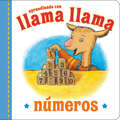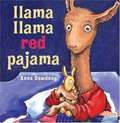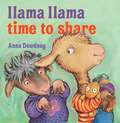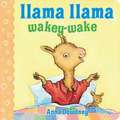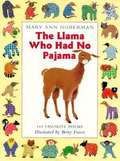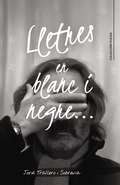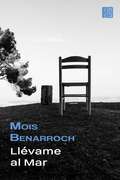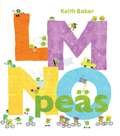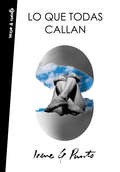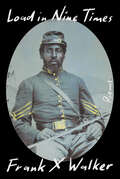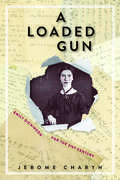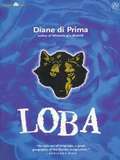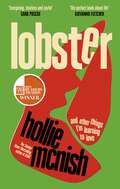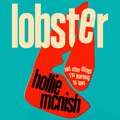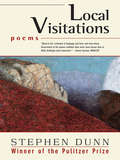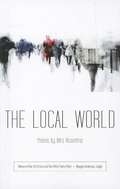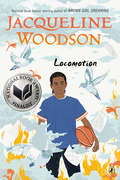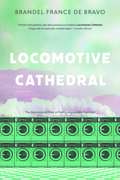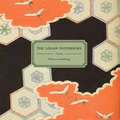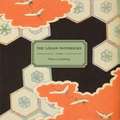- Table View
- List View
Llama Llama Numeros (Llama Llama)
by Anna DewdneyLlama Llama, la serie narrativa infantil de Anna Dewdney y selección de la lista de grandes éxitos en The New York Times regresa con un nuevo libro de cartón para aprender los números y a contar poniéndolo todo en su lugar. ¡Es hora de organizar! Vamos a acompañar a Llama Llama en lo que ayuda a su mamá a limpiar y contar todo el desorden que ha dejado. Desde 10 libros para recoger hasta una mamá Llama para querer, este nuevo libro infantil de cartón –escrito en rima e ilustrado por JT Morrow– explora lo divertido que es guardar todo en su lugar y contar en cuenta regresiva.
Llama Llama Red Pajama
by Anna DewdneyA bedtime story. A good-night kiss. And Mama Llama turns off the light. But is everything all right? NO! At least, Baby Llama doesn't think so. . . . And soon his whimpers turn to HOLLERS. It's an all-out llama drama! Until Mama returns to set things right. Warm, fuzzy, and very funny, Llama Llama Red Pajama is sure to bring smiles of recognition to children and parents alike!
Llama Llama Time to Share
by Anna DewdneyLlama has a sharing drama! Build a tower. Make a moat. Nelly's dolly sails a boat. What can Llama Llama add? Maybe sharing's not so bad. Llama Llama has new neighbors! Nelly Gnu and her mama stop by for a play date, but Llama's not so sure it's time to share all his toys. Maybe just his blocks? It could be fun to make a castle with Nelly... But wait--Nelly has Llama's little Fuzzy Llama! The fun turns to tears when Fuzzy Llama is ripped in two, "all because of Nelly Gnu!" Mama comes to the rescue and fixes Fuzzy, but she makes it clear: "I'll put Fuzzy on the stairs, until you're sure that you can share. " Fun to read aloud and helpful to children and parents alike, Llama Llama Time to Share is for any child who needs a little encouragement in sharing. picture descriptions added on picture pages only.
Llama Llama Wakey-wake
by Anna DewdneyStart a brand-new day the Llama way with this new board book by Anna Dewdney. A good day starts with breakfast and brushing, kissing and hugging. Picture descriptions on picture only pages.
The Llama Who Had No Pajama: 100 Favorite Poems
by Mary Ann Hoberman"If you're sleepy in the jungle/And you wish to find a pillow,/Take a friendly word of warning:/DO NOT USE AN ARMADILLO! . . ." Covering everything from centipedes to whales, from swinging on swings to ice-skating in winter, from eating applesauce to celebrating birthdays, the delightful poems in this collection convey the experiences of childhood with a timeless freshness.
Lletres en blanc i negre...
by Jordi Trallero i SobreviaCatarsi d´un supervivent... Aquest recull de poemes i fotografies va néixer, sense jo saber-ho, a mitjans del 2015 durant un periode que vaig estar ingressat a diferents hospitals psiquiàtrics fins mitjants de 2016. Un cop donat d´alta vaig continuar escrivint més continua i seriosament. Escriure aquests poemes i illustrar-los amb fotografies va pendre forma a finals del 2016 i principi del 2017. Aquest texte i aquestes imatges m´han ajudat a conèixer-me a mi mateix i han canviat la meva vida.
Llévame al Mar
by Mois Benarroch Aarón Lasanta VanhoutteghemUna colección de poemas de la última década, incluyendo traducciones del hebreo y español, además de poemas escritos en inglés por el reconocido poeta israelí Mois Benarroch. Entre el Rayo y el Trueno Entre el rayo y el trueno para cuando veo tu luz ya hay demasiado ruido. Aquí En estas calles el ángel que caminó antes que yo me ayudó a caminar evitando que cayera me salvó cuando tuve un accidente de coche en la cabeza cerca de la sinagoga sobre la cabeza del año aquí en estas calles tan vacías de mí lloré por primera vez sonreí por primera vez y desde aquí viajé a todas partes ahora he vuelto buscando la comprensión de las casas, las calles, las aceras, la gente. Si Me Ves por la Calle y no te saludo no creas que no quiero tu compañía o que intento hacerte daño si me ves por la calle y estoy pensando en otro poema en otras palabras que puedan por fin describir la línea del firmamento que se conecta entre mis piernas y la ciudad en la que nací un gran arco iris si me ves por la calle y no digo hola no es una declaración de guerra sino una mirada hacia el futuro. Arena me llevó veinte años aprender a llorar en hebreo entonces mis palabras se volvieron suaves como una roca cuyo secreto fue desvelado por la lluvia: estaba hecha de arena.
LMNO Peas
by Keith BakerBusy little peas introduce their favorite occupations, from astronaut to zoologist.
Lo que todas callan
by Irene G PuntoLo que todas callan es un poemario visceral y sensitivo sobre algo de lo que nunca se ha hablado en poesía: el posparto y el origen de los sentimientos maternales. Lo que todas callan es el resultado de mi encuentro con el amor, el dolor, el silencio y la supervivencia convertido en versos dispuestos a poner luz a muchos tabúes que, como mujer y como madre, me bebí sin sed. La RAE dice que el posparto es el periodo que transcurre desde el parto hasta que la mujer vuelve al estado ordinario anterior a la gestación. Pero para mí esta definición es inexacta y vengo con un puñado de poemas para enriquecerla. Reseñas:«Este libro es una reconciliación, pero también es volver a abrir unas heridas que no sanarán del todo nunca. Afortunadamente. Unas cicatrices hechas poema que me dicen que yo también estuve ahí, en ese lugar del que nadie me había hablado.»Zahara «Irene G Punto ha cogido un margeny lo ha hecho suyo. Hablo del margen de la maternidad en general, y del margen del posparto en particular. Pocas veces se había escrito así sobre un momento de la vida del cuerpo de quien fue madre en el que todo pueden ser sombras iluminadas por unas leves y diminutas luces.»Luna Miguel «Hay dos formas de ser original y merecer ser oído: decir lo que nadie sabe o lo que muchos ocultan. Este libro tiene el valor de hacer lo segundo, porque abre una ventana de la maternidad que estaba condenada y por la que ahora entra el sol y la luz, pero también el frío. Sus poemas los ha escrito Irene G Punto, pero los firmarían Anne Sexton o Sylvia Plath.»Benjamín Prado
Load in Nine Times: Poems
by Frank X. WalkerA stirring and historically substantive tribute to literal freedom fighters that provides inspiration and instruction for all who believe in liberation in illiberal times. —Cortney Lamar Charleston For decades Frank X Walker has reclaimed essential American lives through his pathbreaking historical poetry. In this stirring new collection, he reimagines the experiences of Black Civil War soldiers—including his own ancestors—who enlisted in the Union army in exchange for emancipation. Moving chronologically from antebellum Kentucky through Reconstruction, Walker braids the voices of the United States Colored Troops with their family members, as well as slave owners and prominent historical figures from Abraham Lincoln to Frederick Douglas and Margaret Garner. Imbued with atmospheric imagery, these persona poems and more “[clarify] not only the inextricable value of Black life and labor to the building of America, but the terrible price they were forced to pay in producing that labor” (Khadijah Queen). “How do you un-orphan a people?” Walker asks. “How do you pick up / shattered black porcelain and make / a new set of dishes fit to eat off?” While carefully attuned to the heartbreak and horrors of war, Walker’s poems pay equal care to the pride, perseverance, and triumphs of their speakers. Evoking the formerly enslaved General Charles Young, Walker hums: “I am America’s promise, my mother’s song, / and the reason my father had every right to dream.” Expansive and intimate, Load in Nine Times is a resounding ode to the powerful ties of individual and cultural ancestry by an indelible voice in American poetry.
A Loaded Gun
by Jerome Charyn"Remarkable insight . . . [a] unique meditation/investigation. . . . Jerome Charyn the unpredictable, elusive, and enigmatic is a natural match for Emily Dickinson, the quintessence of these." -Joyce Carol Oates, author of Wild Nights! and The Lost LandscapeWe think we know Emily Dickinson: the Belle of Amherst, virginal, reclusive, and possibly mad. But in A Loaded Gun, Jerome Charyn introduces us to a different Emily Dickinson: the fierce, brilliant, and sexually charged poet who wrote: My Life had stood-a Loaded Gun-...Though I than He- may longer liveHe longer must-than I-For I have but the power to kill,Without-the power to die-Through interviews with contemporary scholars, close readings of Dickinson's correspondence and handwritten manuscripts, and a suggestive, newly discovered photograph that is purported to show Dickinson with her lover, Charyn's literary sleuthing reveals the great poet in ways that have only been hinted at previously: as a woman who was deeply philosophical, intensely engaged with the world, attracted to members of both sexes, and able to write poetry that disturbs and delights us today.Jerome Charyn is the author of, most recently, Bitter Bronx: Thirteen Stories, I Am Abraham: A Novel of Lincoln and the Civil War, and The Secret Life of Emily Dickinson: A Novel. He lives in New York.
Lošalaba Lwa Bomme: UBC Contracted
by B. D. Magoleng S. F. MotlhakeBuka e, e tshotse maboko a a itlhametsweng, a a itshetlegileng thata mo maitemogelong a mo botshelong, e etse tlhoko segolo bogolo ditiro tse motho a di dirang, gantsi tse di botlhoko – a se na letswalo le kutlwelobotlhoko.
Lošalaba Lwa Bomme: UBC Uncontracted
by B. D. Magoleng S. F. MotlhakeBuka e, e tshotse maboko a a itlhametsweng, a a itshetlegileng thata mo maitemogelong a mo botshelong, e etse tlhoko segolo bogolo ditiro tse motho a di dirang, gantsi tse di botlhoko – a se na letswalo le kutlwelobotlhoko.
Loba
by Di Prima DianeLoba is a visionary epic quest for the reintegration of the femimine, hailed by many as the great female counterpart to Allen Ginsberg's Howl when the first half appeared in 1978. Now published for the first time in its completed form with new material, Loba, "she-wolf" in Spanish explores the wilderness at the heart of experience, through the archetype of the wolf goddess, elemental symbol of complete self-acceptance. .
Loba
by Diane Di PrimaLoba is a visionary epic quest for the reintegration of the femimine, hailed by many as the great female counterpart to Allen Ginsberg's Howl when the first half appeared in 1978. Now published for the first time in its completed form with new material, Loba, "she-wolf" in Spanish explores the wilderness at the heart of experience, through the archetype of the wolf goddess, elemental symbol of complete self-acceptance.
Lobster: and other things I’m learning to love: 'energising, fearless and joyful' Sara Pascoe
by Hollie McNishA brand-new collection from the award-winning poet, the companion piece to the Sunday Times bestselling Slug'Funny, so smart and refreshingly honest' SARAH MILLICAN'Hollie McNish's words always sweep me away' GIOVANNA FLETCHERThis book is written out of both hate and love for the worldAs people, we are capable of both love and hate; amazement and disgust; fun and misery. So why do we live in a world that is constantly telling us to hate, both ourselves and others? We are told to be repulsed by our own bodies, bodies that let us laugh and sweat and eat toast; to be ashamed of pleasure; to be embarrassed by fun. In this collection, Hollie McNish brings her inimitable style to the question of what have been taught to hate, and if we might learn to love again.'Never have we needed her more' STYLIST'I've loved her work for years' JO BRAND'She writes with honesty, conviction, humour and love' KAE TEMPEST
Lobster: and other things I’m learning to love: 'energising, fearless and joyful' Sara Pascoe
by Hollie McNishA brand-new collection from the award-winning poet, the companion piece to the Sunday Times bestselling Slug'Funny, so smart and refreshingly honest' SARAH MILLICAN'Hollie McNish's words always sweep me away' GIOVANNA FLETCHERThis book is written out of both hate and love for the worldAs people, we are capable of both love and hate; amazement and disgust; fun and misery. So why do we live in a world that is constantly telling us to hate, both ourselves and others? We are told to be repulsed by our own bodies, bodies that let us laugh and sweat and eat toast; to be ashamed of pleasure; to be embarrassed by fun. In this collection, Hollie McNish brings her inimitable style to the question of what have been taught to hate, and if we might learn to love again.'Never have we needed her more' STYLIST'I've loved her work for years' JO BRAND'She writes with honesty, conviction, humour and love' KAE TEMPESTPLEASE NOTE: When you purchase this title, the accompanying PDF will be available in your Audible Library along with the audio.
Lobster: and other things I’m learning to love: 'energising, fearless and joyful' Sara Pascoe
by Hollie McNishA brand-new collection from the award-winning poet, the companion piece to the Sunday Times bestselling Slug'Funny, so smart and refreshingly honest' SARAH MILLICAN'Hollie McNish's words always sweep me away' GIOVANNA FLETCHERThis book is written out of both hate and love for the worldAs people, we are capable of both love and hate; amazement and disgust; fun and misery. So why do we live in a world that is constantly telling us to hate, both ourselves and others? We are told to be repulsed by our own bodies, bodies that let us laugh and sweat and eat toast; to be ashamed of pleasure; to be embarrassed by fun. In this collection, Hollie McNish brings her inimitable style to the question of what have been taught to hate, and if we might learn to love again.'Never have we needed her more' STYLIST'I've loved her work for years' JO BRAND'She writes with honesty, conviction, humour and love' KAE TEMPEST
The Lobsters' Night Before Christmas
by Christina LaurieA coastal Christmas tale sure to delight fans of Clement C. Moore's classic Christmas poemBeautiful watercolor illustrations and rhyming verse show Sea Santa visiting a family of lobstersFun lobster facts follow the poem, such as what they eat and how they molt
Local Visitations: Poems
by Stephen DunnWise and searching new poems from the winner of the 2000 Pulitzer Prize in Poetry. In his twelfth collection, his first since winning the Pulitzer Prize, Stephen Dunn turns his keen gaze on Sisyphus, our contemporary Everyman. Free, for the time being, from the power of the gods and the ceaseless weight of the rock, he struggles to navigate twenty-first-century America. In language by turns mordant and tender, often elegiac, Dunn illuminates the quotidian burdens of his all-too-human hero, as well as the abrasions of ambivalence and choice, finally concluding that "here / and there, though mostly here, even fate is reversible / with struggle or luck." In a second sequence of poems, nineteenth-century novelists become "local visitors" to the author's South Jersey towns. "Chekhov in Port Republic," "Jane Austen in Egg Harbor," "Dostoyevsky in Wildwood": these inventions and others give Dunn provocative new latitudes. As in his previous books, "he balances the casual and the vivid as he plumbs the ambiguity and mystery of human relations" (New York Times Book Review).
The Local World: Poems
by Mira RosenthalMira Rosenthal's The Local World incorporates deeply lived experience and mystery in a fluent shape-shifting that can take you anywhere--and bring you back, changed. The poems are beautifully crafted narratives of loss, travel, and salvage. There is a damaged family at the heart of these poems, an abandoned farm, and many rooms, parks, and train cars in far places. Yet, like all really good poems, Rosenthal's language consistently rises above its cries to wonder and beauty. What a joy to find this stunning first book to award the Stan and Tom Wick Poetry Prize.
Locomotion (New Windmill Ser.)
by Jacqueline WoodsonFinalist for the National Book AwardWhen Lonnie was seven years old, his parents died in a fire. Now he's eleven, and he still misses them terribly. And he misses his little sister, Lili, who was put into a different foster home because "not a lot of people want boys-not foster boys that ain't babies." But Lonnie hasn't given up. His foster mother, Miss Edna, is growing on him. She's already raised two sons and she seems to know what makes them tick. And his teacher, Ms. Marcus, is showing him ways to put his jumbled feelings on paper.Told entirely through Lonnie's poetry, we see his heartbreak over his lost family, his thoughtful perspective on the world around him, and most of all his love for Lili and his determination to one day put at least half of their family back together. Jacqueline Woodson's poignant story of love, loss, and hope is lyrically written and enormously accessible.
Locomotive Cathedral (The Backwaters Prize in Poetry Honorable Mention)
by Brandel France de BravoWith wit and vulnerability, Brandel France de Bravo explores resilience in the face of climate change and a global pandemic, race, and the concept of a self, all while celebrating the power of breath as &“baptism on repeat.&” Whether her inspiration is twelfth-century Buddhist mind-training slogans or the one-footed crow who visits her daily, France de Bravo mines the tension between the human desire for permanence and control, and life&’s fluid, ungraspable nature. Poem by poem, essay by essay, she builds a temple to the perpetual motion of transformation, the wondrous churn of change and exchange that defines companionship, marriage, and ceding our place on Earth: &“not dying, but molting.&”
The Logan Notebooks (Mountain West Poetry Series #7)
by Rebecca LindenbergPublished by the Center for Literary Publishing at Colorado State University Mountain West Poetry Series “These poems are intent on calling out the migratory beauty of this world, in a neighbor-voice: friendly, from the yard nearby, pointing out stuff we might not have noticed. They frequently employ that most ancient of forms, the list, to show us what we shine a light on, what we look past, what we reflect, what we miss. In that way, they speak like the meadowlark who says, See you! See you! These poems are for when we shall no longer fear the ecstatic, because we’ll know that ecstasy too is quotidian, as daily as a meadowlark’s shopping list.” —Eleni Sikelianos “In her second collection, Rebecca Lindenberg turns her scrutiny to the American West without forgetting the many layers of sediment and memory there and in other elsewheres. From grocery stores in Utah to a synagogue in Rome to cloud-gazing everywhere, in poems at turns laconic and lush, wistful and wry, Lindenberg shows how beauty and absurdity can and will persist—even, or especially—in the loss of our multiple loves and multiple selves.” —Tarfia Faizullah “Recursive and elliptical, the poems in Rebecca Lindenberg’s The Logan Notebooks are as difficult to depict as they are to forget. Like clouds (themselves, so omnipresent and imperative that Lindenberg confronts them on the first page), these poems shift, then settle into shape, then shift once again. More usual iterations of poetry give way to paragraphs of unimpeachable prose, itemized narratives in which whole, epic plots are cached. Lists run left to right as if they actually listed, like boats off-ballast or stand-alone willows in windstorms. Catalogues are first climactic then cathartic. What she does not write, she has somehow written. Aphorisms become offerings. Almost every line is a sutra. If ‘anyone who feels they have to lie’ is a thing that has lost its power, then Rebecca Lindenberg need not worry. Neither these poems nor the poet who conceives them flinches at gut-punch truth.” —Jill Alexander Essbaum “The American West, in its mythical and real-time complexity, is ‘itched out of reverie’ and ‘brought into the deep groove of the present’ in Rebecca Lindenberg’s The Logan Notebooks. The grotesquerie of capitalism hangs in the background, sometimes the foreground, but her lines don’t flinch as they ‘attend to these/details that might later/divert you.’ Above all this is a book about relationships—to a beloved, a family, a landscape, a country, and language itself. ‘Somewhere between the sayable and the unsayable,’ Lindenberg’s poems startle life from a fractured world. The Logan Notebooks is a balm and an anomaly.” —Joseph Massey Clouds, mountains, flowering trees. Difficult things. Things lost by being photographed. Things that have lost their power. Things found in a rural grocery store. These are some of the lists, poems, prose poems, and lyric anecdotes compiled in The Logan Notebooks, a remix and a reimagining of The Pillow Book of Sei Shonagon, a collection of intimate and imaginative observations about place—a real place, an interior landscape—and identity, at the intersection of the human with the world, and the language we have (and do not yet have) for perceiving it.
The Logan Notebooks
by Rebecca LindenbergClouds, mountains, flowering trees. Difficult things. Things lost by being photographed. Things that have lost their power. Things found in a rural grocery store. These are some of the lists, poems, prose poems, and lyric anecdotes compiled in The Logan Notebooks, a remix and a reimagining of The Pillow Book of Sei Shonagon, a collection of intimate and imaginative observations about place--a real place, an interior landscape--and identity, at the intersection of the human with the world, and the language we have (and do not yet have) for perceiving it.
